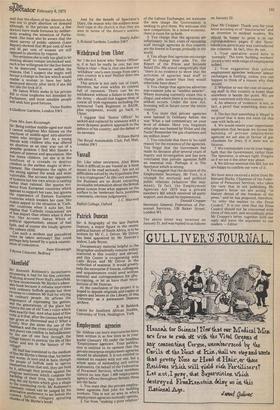Employment agencies
Sir: Seldom can more inaccuracies have been written in so few lines as in your leader (January 18) under the headline 'Employment agencies'. Your publication is entitled to its opinion that the private enterprise employment agencies should be abolished. It is not entitled to mislead its readers with not one, but a whole spate of misleading and untrue statements. On behalf of the Federation of Personnel Services, whose members control no less than 1,400 employment agency offices throughout Britain, these are the facts: I. You state that the private employment agencies find jobs for building workers. This is not an area in which employment agencies normally operate. 2. Far from "making a poor relation" of the Labour Exchanges, we welcome the new image the Government is seeking to give them. We welcome this new competition. In a mixed economy, there is room for us both.
3. You charge that the agencies are inflationary. In fact, costs of recruiting staff through agencies in this country are the lowest in Europe, probably in the world.
4. You allege that agencies encourage staff to change their jobs. Yet, the Report of the Prices and Incomes Board (No. 89) stated categorically that "there is no evidence to show that the activities of agencies lead staff to change jobs sooner than they would otherwise have done."
5. You charge that agencies advertise non-existent jobs at "wishful salaries". Where licensing currently exists this is illegal, and where there is no licensing it seldom occurs. Under the new Act, licensing will in future cover the entire country.
6. You state that private agencies were banned in Germany before the war. What a sad commentary on your level of debate. Have you forgotten what else was banned by Hitler and the Nazis? Remember the gas chambers and six million Jews?
7. You conclude that there is 'no valid reason' for the existence of the agencies. You forget that the Goverment has made its decision after several years of inquiry and investigation and has now concluded that private agencies fulfil an essential role. Perhaps it is The Spectator which is wrong.
8. You suggest that the decision of the Employment Secretary, Mr Foot, is a triumph for sectional and political public relations (whatever this may mean). In fact, the Employment Agencies Act 1973 was a private member's Bill which received all-party support, and should be implemented.
Donald Cropper Secretary General, Federation of Personnel Services, 120 Baker Street, London WI The above letter was received on January 21, and was replied to as follows on January 22:
Dear Mr Cropper: Thank you for your letter accusing us of "inaccuracies" and an intention to mislead readers. We should be happy to print it in our correspondence pages if the 'facts' which you gave in any way contradicted the comment. In fact, they do not. I. Your operative word here is 'normally'. The term 'building workers' covers a very wide range of employment indeed.
2. Your suggestion that private employment agencies 'welcome' labour exchanges is footling; unless you can happen to think of a reason why they should.
3. Whether or not the cost of recruiting staff in this country is lower than elsewhere is beside the point. We are only concerned with this country.
4. An absence of 'evidence' is not, in fact, a proof that something does not exist.
5. The fact that something is 'illegal' is no proof that it does not exist (in this case with bells on).
6. We would resent your impertinent implication that because we favour the banning of private employment agencies we are also in favour of gas chambers for Jews, if it were not so fatuous.
7. We contratulate you on your happy faith that the Government, rather than The Spectator, is always right. Forgive us if we see it the other way about.
8. We did not mention this Bill, but we are happy to confirm our view of it.
We have since received a letter from Mr Bernard Marks, Chairman of the Federation of Personnel Services, who Lakes the view that in not publishing Mr Cropper's letter we are acting "in blatant denial of the freedom of the press," and he has proposed, therefore, "to refer the matter to the Press Council." It is our view that the Press Council should not be concerned with trivia of this sort, and accordingly print Mr Cropper's letter, together with our reply and leave the argument to our readers. — Editor.


































 Previous page
Previous page